- Home
- Joan Lowery Nixon
The Island of Dangerous Dreams
The Island of Dangerous Dreams Read online
Books by Joan Lowery Nixon
FICTION
A Candidate for Murder
The Dark and Deadly Pool
Don’t Scream
The Ghosts of Now
Ghost Town: Seven Ghostly Stories
The Haunting
In the Face of Danger
The Island of Dangerous Dreams
The Kidnapping of Christina Lattimore
Laugh Till You Cry
Murdered, My Sweet
The Name of the Game Was Murder
Nightmare
Nobody’s There
The Other Side of Dark
Playing for Keeps
Search for the Shadowman
Secret, Silent Screams
Shadowmaker
The Specter
Spirit Seeker
The Stalker
The Trap
The Weekend Was Murder!
Whispers from the Dead
Who Are You?
NONFICTION
The Making of a Writer
“Just one more thing,” I said. “There’s something I don’t understand. Why couldn’t the judge show you the artifact here? Why do you have to go to his island? It all sounds weird to me. Urgent telephone calls, secret information, maybe even a boat slipping through the dark water at night—”
“Andrea!” Madelyn snapped. “I told you to comb your hair! No more nonsense!”
But as I left the room I could see the indecision in her eyes. I could guess that I wasn’t the only one who had some questions about the judge’s actions.
This is a work of fiction. Names, characters, places, and incidents either are the product of the author’s imagination or are used fictitiously. Any resemblance to actual persons, living or dead, events, or locales is entirely coincidental.
Copyright © 1989 by Joan Lowery Nixon
All rights reserved. Published in the United States by Delacorte Press, an imprint of Random House Children’s Books, a division of Random House LLC, New York, a Penguin Random House Company. Originally published in paperback by Bantam Doubleday Dell Publishing Group, Inc., an imprint of Random House Children’s Books, a division of Random House LLC, New York, in 1989.
Laurel-Leaf Books with the colophon is a registered trademark of Random House LLC.
Visit us on the Web! randomhouse.com/kids
Educators and librarians, for a variety of teaching tools, visit us at RHTeachersLibrarians.com
Library of Congress Cataloging-in-Publication Data is available upon request.
eISBN: 978-0-307-82344-1
First Delacorte Press Ebook Edition 2013
Random House Children’s Books supports the First Amendment and celebrates the right to read.
v3.1
For Martha Farrington,
whose Murder by the Book is a happy little island
of dangerous dreams
Contents
Cover
Other Books by This Author
Title Page
Copyright
Dedication
Chapter 1
Chapter 2
Chapter 3
Chapter 4
Chapter 5
Chapter 6
Chapter 7
Chapter 8
Chapter 9
Chapter 10
Chapter 11
Chapter 12
Chapter 13
Chapter 14
Chapter 15
About the Author
CHAPTER
1
I strongly objected to spending a whole month of my summer vacation with Aunt Madelyn. Madelyn scared me.
She was Mom’s sister, but she wasn’t the least bit like Mom, who was—well, Mom. Mom had the same red hair that her parents had and that I inherited, complete with freckles. On all the charts she would have been checked off as average, except for ten pounds she constantly kept trying to lose. But Madelyn Forbes, in her designer clothes, was tall and very thin with sleek, black hair, narrow red lips, and deep-set eyes. When I was little I thought she was the wicked queen in Disney’s Snow White.
When I grew a little older and discovered Irish folk tales, I became certain that Madelyn was a changeling, left in the real baby’s cradle by evil faeries. Finally, more sophisticated in my knowledge of the world, I decided that the hospital had mixed up records and sent the wrong baby home with Grandma.
Each time I shared my observations with Mom she’d try to explain. “Madelyn is basically a lonely person. She has—well—a little trouble in her relationships with people. She has problems, Andy. Try to understand her.”
Now, as I faced Mom across the kitchen table, I said, “Aunt Madelyn scares me, Mom. She’s—well, she’s creepy.”
“Nonsense!” Mom sighed and gazed upward, as though the proper answers for me were pasted on the ceiling.
“Yes, she is too.” I tried to make my point. “I still remember when she was here two years ago. She was gloating about some art object that she wanted for that private museum she works for. She said she would have killed to get it, and she chuckled like a mad fiend.”
“Andrea,” Mom warned. “Don’t get so dramatic that you embroider the truth.”
“Okay, okay,” I said. “She did say that, but the point is that while Madelyn was telling us about this art object her eyes got strange and slanty and glittered like those deep blue marbles underwater in the bottom of your fish bowl, and she gasped a lot while she talked, and her fingers dug into the arms of her chair. And that was creepy.”
Mom sighed. “Must you exaggerate like that?”
“I’m not exaggerating. I’m telling what happened.” I paused. “Don’t blame me. Blame heredity.”
Mom blinked. “For what?”
“For the way I describe things. The Irish are great storytellers.”
Mom tried so hard not to laugh that she pursed her lips and rubbed her chin. Finally she said, “Listen, Andy, I mean it. You’ve got things out of proportion. I remember the time you’re talking about. Madelyn was merely excited about her purchase, that’s all.”
I rolled my eyes. “Excited? The understatement of the year. I forgot to say she salivated too.”
This time Mom gave up the fight and laughed. She reached across the kitchen table to beat me to the last chocolate cookie in the package. “When are you going to grow up?” she asked.
“I am grown up. I’m seventeen. I’m old enough to get a job this summer, not go to Palm Beach to visit Aunt Madelyn.”
Mom gulped down the last crumb of cookie and her eyes became serious. “If you’re so grown up,” she said, “then let’s discuss this situation as two adults would. Your father and I are trying to—to work out a problem.”
I nodded, only too unhappily familiar with the frosty silences between them that caught me in the same draft. My dad’s a great guy, so good at working out personnel problems for his Houston company that his boss uses him overtime as a troubleshooter. Mom is probably one of the best student counselors in the nearby Bayport school district, known for getting a lot of kids back on their feet and headed in the right direction. They understand people so well. They just couldn’t seem to understand each other.
It’s awful to think that your parents might split up. At night I’d pull the blanket over my head, as though that would shut out all the unhappiness in our house, and try to pretend that all the smiles and hugs were back in place, but it didn’t work. I’d read the magazine articles that say kids unfairly blame themselves when their parents’ marriages break up, but even so the guilt was heavier than my blanket, and I’d ask myself over and over, “Did I do something wrong? Was it my fault?” There wasn’t anyone to answer.
&
nbsp; Mom and Dad weren’t the only ones who were having problems. My throat tightened, and it hurt to swallow, as I thought of the differences I had had with Rick, differences that became arguments, arguments that had suddenly turned into a final good-bye.
“You have to learn to roll with the punches,” Rick grumbled at me. “The world isn’t fair, and part of growing up is accepting that fact. You’re too intense. You take on a cause and don’t let go. Sometimes you drive me crazy.”
“But if something is wrong—”
“Then let someone else handle it for a change. Like that thing with Mrs. What’s-her-name in the library.”
“She’s not Mrs. What’s-her-name!” I shouted at him. “She’s Mrs. Lankersham! And she’s worked as a library aide ever since I was a little kid, and now the mayor wants to make more library cuts and kick her and the other aides out, and—”
“Spare me,” Rick said. He gave a long sigh and I could see him deliberate, then change tactics. He smiled. “Andy, that civic meeting is the same night as the BeeJay dance.”
I just nodded.
“So make a choice,” he said.
“I don’t have a choice,” I whispered, hoping with all my heart that he’d understand and knowing he wouldn’t. “Mrs. Lankersham has been a friend almost all my life. I can’t let her down. I promised that—”
“You made some promises to me too.”
“But—”
“I told you. Make a choice.”
I shivered, not just because I was hurt. Anger began as a hot, tight lump in my chest and exploded into sharp, red flashes. No one had the right to back me against a wall—not even Rick. “Then I choose Mrs. Lankersham,” I snapped.
I don’t think I really expected Rick to give in. I was just reacting, not thinking at all. Rick isn’t the only one who tells me that I’m stubborn. Mom has said it too. But I couldn’t help my decision. I couldn’t desert Mrs. Lankersham.
Rick stuck his hands in his pockets and stared down at the ground for a few minutes. When he looked up he had a strangely calm expression on his face. “I guess this is it, Andy,” he said.
Now I was scared. “What do you mean?” I asked him. I knew darned well what he meant, but I couldn’t believe it.
“Look, we’ve had a lot of fun together. I guess we really cared a lot about each other for a while—”
I grabbed his arm, interrupting. “But I do care! I love you!”
“Not enough,” he said.
“How about you?” I whispered. “I thought you cared about me.”
He shook his head and stepped away from me. “It’s over, Andy,”
“No! Rick, if you could just try to understand about Mrs. Lankersham—”
“It’s not just the Mrs. Lankersham thing. It’s—well, it’s just time for both of us to move on.”
“I don’t believe it,” I insisted. “I won’t!”
“You’re making this tougher than it needs to be.”
I could feel the tears on my cheeks, but I didn’t try to brush them away. “I’m making it tough?” I shouted at him. “Don’t try to blame me!”
Rick just shrugged. “Grow up, Andy,” he said.
I watched him walk away. I would never forget that moment.
“Andy.” Mom laid her hand on mine, jolting me back to the present. “I also thought that you might like to get away from Bayport for a while.” She added hesitantly, “Now that you and Rick aren’t dating any longer.”
“That sounds too final,” I said quickly, her words making everything even worse. “Maybe …”
I stopped, and Mom tried a tentative smile. “Honey, you have to face facts. Rick’s dating another girl. It’s time for you to go out with other boys.”
“I don’t want to. It wouldn’t be any fun.”
“You’re only seventeen, Andy, and Rick was just a first love.”
I stubbornly shook my head, but she didn’t stop.
“You have to let go,” Mom said.
I folded my arms tightly across my chest and said, “I don’t want to talk about Rick.”
“Okay,” Mom answered. “Then let’s talk about your father and me. We’re honestly trying to work out our problems, and I know that we will, given a little quiet time together.”
They wanted me out of the way, while at the same time I wanted to cling to them. I tried to hide the pain and keep it light. “Get rid of the kid,” I said. “Send her to the movies. Ship her off to camp. Sell her to the gypsies.”
“Andrea!”
I winced at the hurt in her eyes. “Take it easy, Mom,” I said. “You’ve heard of ‘laughing to keep from crying.’ I’m trying to tell you that I want things to work out too. Of course I’ll help. I’ll go to visit Aunt Madelyn.”
“Thank you,” Mom said.
“Will Madelyn?”
“Will Madelyn what?”
“Thank me for coming? I can’t imagine her wanting to have me as a houseguest for a whole month.”
However, Madelyn wrote a lovely, gracious letter of invitation in a backhand script as elegant as her thick, cream-colored stationery. I accepted on a sheet from a speckled-gray, recycled notepad that was the only paper I could find in the house.
More than a dozen times during the next few days I stood by the telephone, staring at it. Maybe if I called Rick, maybe if he heard my voice …
“Don’t go, Andy,” he’d say. “I’ve missed you. I want to see you again. Now.”
Once I even picked up the receiver and dialed the first three digits of his phone number. But I couldn’t go through with it. I’d call when I came back. That would be a good time to work things out. Not now, but after I came home again. If Mom and Dad could solve their problems—and they would, they had to!—then why couldn’t Rick and I?
While I packed my shorts, T-shirts, and jeans, I tried to keep from thinking about Rick and zeroed in on positive thoughts about visiting Madelyn. Palm Beach was practically next door to Disney World and not very far from the Everglades and Cypress Gardens and all sorts of neat touristy stuff. Surely Aunt Madelyn would want to entertain her one and only niece by going with me to all these places. Wouldn’t she?
It didn’t take long after I arrived in Palm Beach to find out that she wouldn’t.
“This is a golden opportunity for you to broaden your horizons,” Madelyn informed me. “We’ll give you a good introduction to the world of art.”
“I know something about art,” I told her. “Last summer I did some volunteer work at our Bayport science museum, and the museum chairman, Dr. Sammy Kirschman, was a real nut on South American artifacts.”
“A ‘real nut on artifacts’?” Madelyn mimicked. “I do believe, Andrea, that there is a great deal more about art for you to discover.” Aunt Madelyn looked at me as though she’d been handed a hopeless case, and we set off in her little white BMW for a tour of her favorite art museum—the Sartington, where she was curator. It was the first art museum of many.
I have nothing against art museums. In fact, I really like art museums. Mom and I often go to the Houston Museum of Fine Art when we’re in the city, and once, on vacation, Dad, Mom, and I spent a whole, wonderful day in the big Art Institute in Chicago. We saw what we wanted to and skipped the exhibits we didn’t like, and nobody at either place asked questions to see if I was paying attention.
On my fourth day in Palm Beach, Madelyn and I drove down the coast to visit a museum where Aunt Madelyn had an appointment with the curator. She left me in the South and Central American room among the squatty clay figures and broken pots.
“You’ll enjoy this display, since you have a smattering of information on artifacts,” she said. “The museum has a few excellent pieces of hammered-gold jewelry from the Mayan period that will fascinate you. We’ll discuss them when I get back.”
I hated to admit to myself that Aunt Madelyn could be right, but when I found the case containing the gold jewelry and stared inside, my eyes widened with surprise. It wasn’t the same kind of go
ld that was in Mom’s wedding ring or Dad’s wristwatch. It was a deeper yellow and looked softer and more pliable. There were crude marks from what must have been some kind of mallet, but at the same time there was a delicate intricacy in the designs.
A guard sauntered into the room and stood nearby.
I looked up at him and smiled.
“Beautiful, aren’t they?” he said.
“Yes,” I answered, “but they don’t belong here.”
He stretched his neck to glance into the case, as though we weren’t talking about the same thing. “Sure, they do.” His voice was puzzled. “They’re the property of the museum.”
I shook my head. “They’re really the property of the country of Mexico.”
“Naw,” he said, while he studied me to see if I was joking. “The museum owns all this stuff in here.”
“It was stolen,” I told him, and proceeded to fill him in on everything Dr. Kirschman had told us about how countries desperately try to hang on to their artifacts, but looters steal them from archaeological digs and sell them to people who smuggle them into the United States to brokers. Then brokers here sell the artifacts to certain art dealers, who in turn sell them to wealthy art collectors anywhere in the world. I even told him what Dr. Kirschman said about some collectors paying so much money that a lot of crooks who specialize in art theft had gotten into the act.
The guard blinked a couple of times after I finished and said, “Are you trying to tell me that this museum is dealing in stolen artifacts?”
“No,” I said. I bent to peer at the card in the corner of the case. “These pieces were donated. But the person who donated them knew they were stolen.”
He looked puzzled and shrugged. “Does it make any difference how or why the artifacts got here?”
“Of course it does,” I said. “It does to me. It should to everybody. Stealing is stealing, whether it’s from somebody’s house or somebody’s country.”
Aunt Madelyn walked toward us so quickly that her high heels on the marble floor click-clacked as fast as typewriter keys. “Andrea,” she said, “I’ve had an important phone call. We’ve got to get back to my office.”

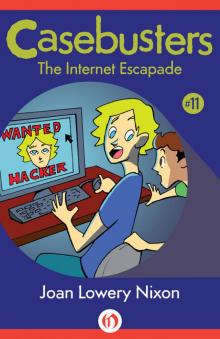 The Internet Escapade
The Internet Escapade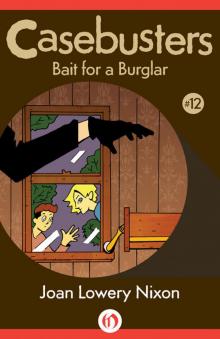 Bait for a Burglar
Bait for a Burglar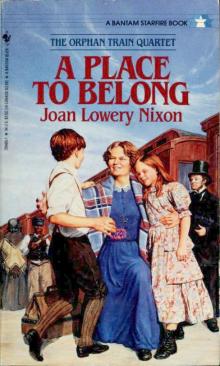 A Place to Belong
A Place to Belong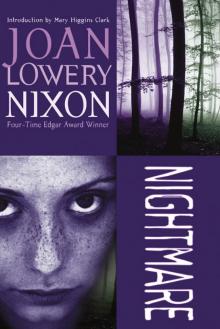 Nightmare
Nightmare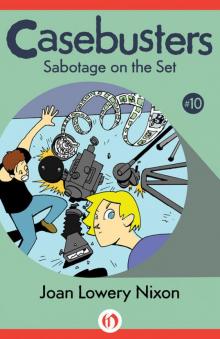 Sabotage on the Set
Sabotage on the Set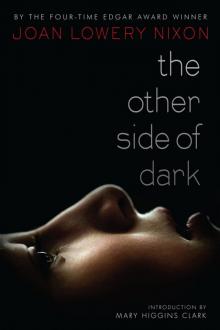 The Other Side of Dark
The Other Side of Dark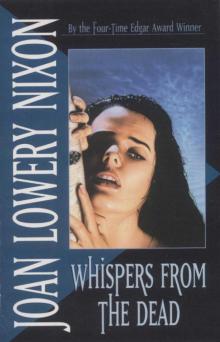 Whispers from the Dead
Whispers from the Dead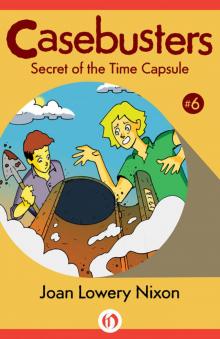 Secret of the Time Capsule
Secret of the Time Capsule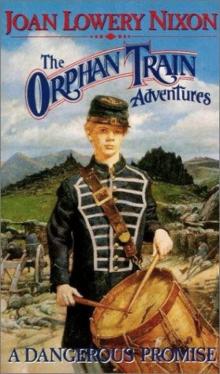 A Dangerous Promise
A Dangerous Promise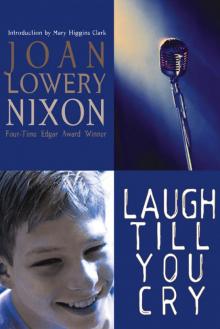 Laugh Till You Cry
Laugh Till You Cry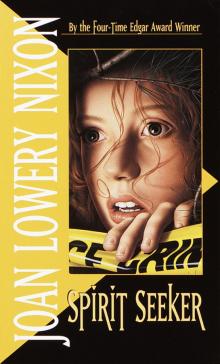 Spirit Seeker
Spirit Seeker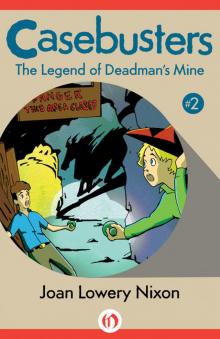 The Legend of Deadman's Mine
The Legend of Deadman's Mine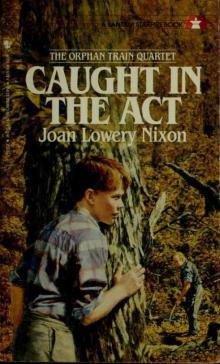 Caught in the Act
Caught in the Act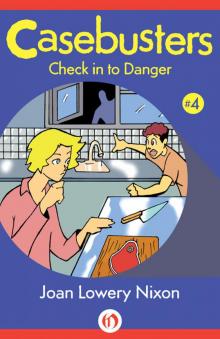 Check in to Danger
Check in to Danger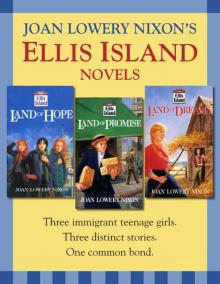 Ellis Island: Three Novels
Ellis Island: Three Novels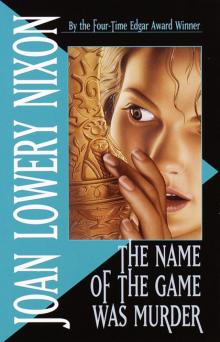 The Name of the Game Was Murder
The Name of the Game Was Murder The Haunting
The Haunting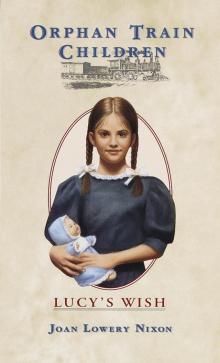 Lucy’s Wish
Lucy’s Wish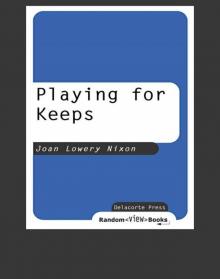 Playing for Keeps
Playing for Keeps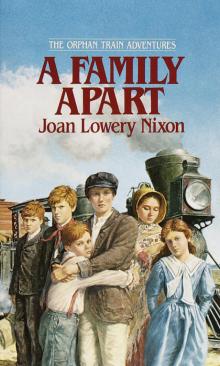 A Family Apart
A Family Apart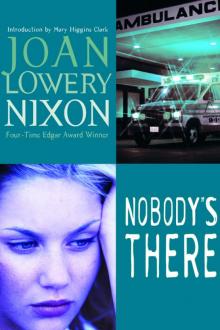 Nobody's There
Nobody's There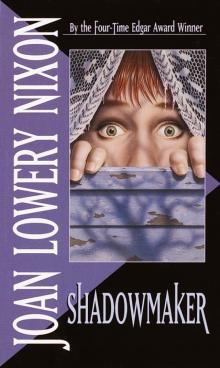 Shadowmaker
Shadowmaker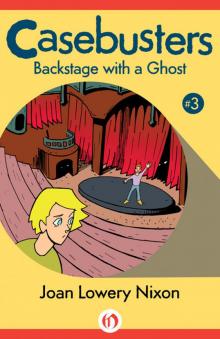 Backstage with a Ghost
Backstage with a Ghost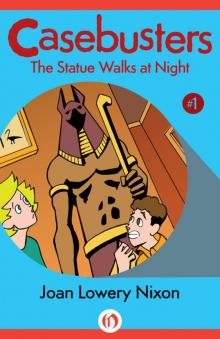 The Statue Walks at Night
The Statue Walks at Night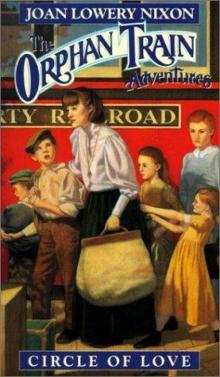 Circle of Love
Circle of Love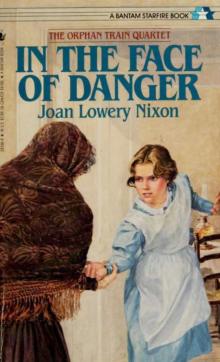 In the Face of Danger
In the Face of Danger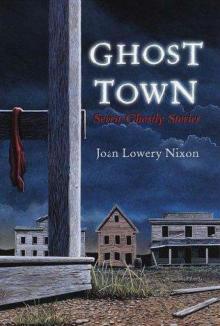 Ghost Town
Ghost Town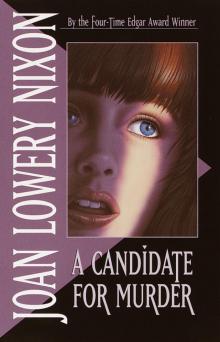 A Candidate for Murder
A Candidate for Murder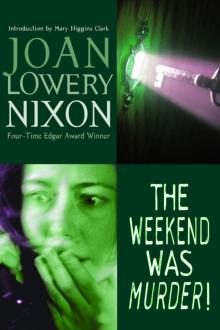 The Weekend Was Murder
The Weekend Was Murder The Island of Dangerous Dreams
The Island of Dangerous Dreams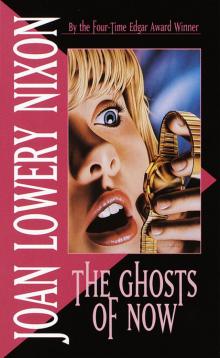 The Ghosts of Now
The Ghosts of Now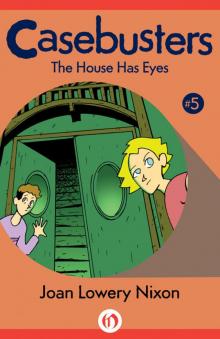 The House Has Eyes
The House Has Eyes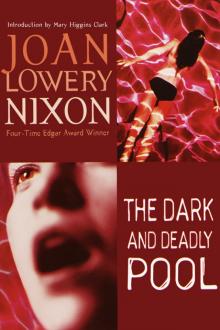 The Dark and Deadly Pool
The Dark and Deadly Pool Keeping Secrets
Keeping Secrets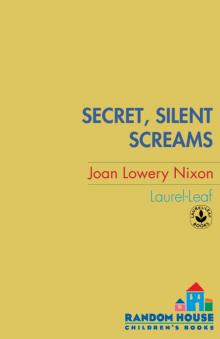 Secret, Silent Screams
Secret, Silent Screams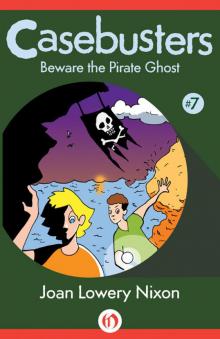 Beware the Pirate Ghost
Beware the Pirate Ghost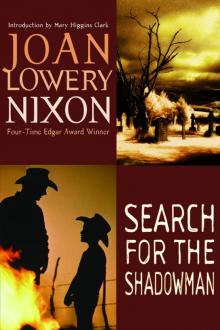 Search for the Shadowman
Search for the Shadowman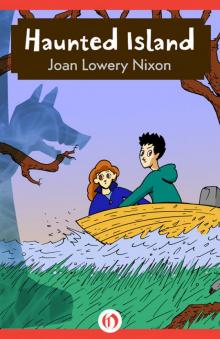 Haunted Island
Haunted Island